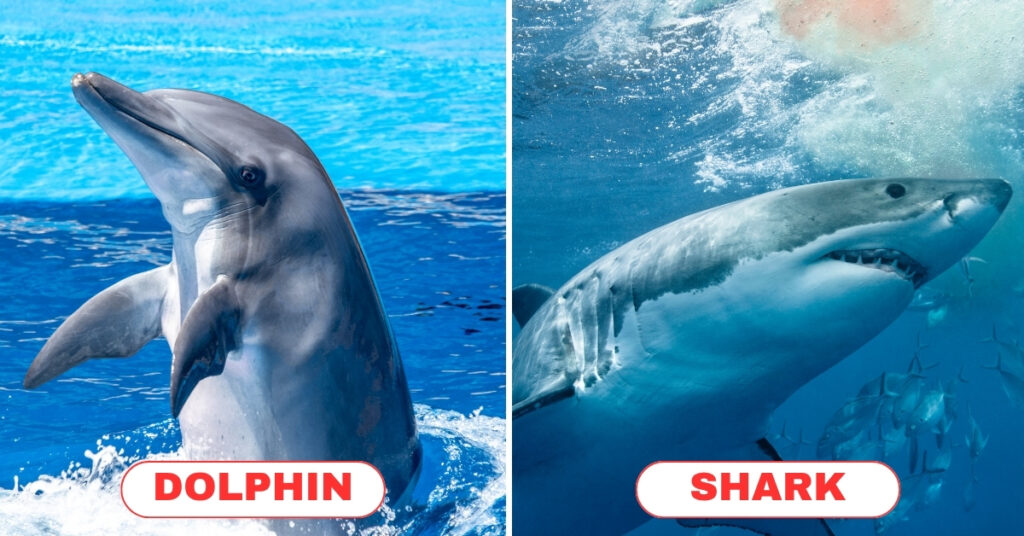When it comes to the ocean’s most interesting creatures, the comparison of dolphins vs sharks often sparks curiosity and debate. Both dolphins and sharks are iconic in their own right, capturing the imagination of marine enthusiasts, scientists, and the general public alike. Despite sharing the same marine environment, dolphin and shark species differ in many ways. In this blog, we’ll explore the difference between sharks and dolphins, uncover their similarities, and debunk some common myths. We’ll also address the debate of sharks or dolphins in terms of intelligence, danger, and ecological roles, and take a closer look at the topic of dolphin vs shark fin.

Shark and Dolphin: An Introduction
At first glance, sharks and dolphins may appear similar due to their streamlined bodies and aquatic lifestyles. However, these similarities are mostly superficial. While both are top predators in their ecosystems, they come from entirely different branches of the animal kingdom. The dolphin shark comparison highlights fascinating distinctions in biology, behavior, and ecology.
Dolphin and Shark: Classification and Biology
The most significant difference between sharks and dolphins lies in their classification:
- Sharks are fish. Specifically, they belong to the class Chondrichthyes, which means their skeletons are primarily made of cartilage.
- Dolphins are mammals in the order Cetacea. Like other mammals, dolphins breathe air, give live birth, and nurse their young.
This distinction affects nearly every aspect of their physiology and behavior. For example, dolphins must surface regularly to breathe through their blowholes, while sharks extract oxygen from water through their gills.
Sharks or Dolphins: Who Rules the Ocean?
Whether sharks or dolphins are dominant predators depends on the context. Both can be top predators, but their hunting methods and prey differ. Large sharks, like the great white, are apex predators, while dolphins often hunt cooperatively in pods.
Shark Dolphin: Physical Differences
When comparing dolphins vs sharks, their physical differences become more evident:
- Body Shape: Dolphins have a sleek, curved body with a pronounced beak and a horizontal tail fin (fluke). Sharks have a more streamlined, torpedo-shaped body with a vertical tail fin.
- Skin and Covering: Shark skin is covered with tiny, tooth-like structures called dermal denticles, making it rough. Dolphin skin is smooth and rubbery.
- Movement: Dolphins move their tails up and down to swim, while sharks move theirs side to side.
Dolphin and Shark: Behavioral Differences
Behavior is another area where sharks and dolphins diverge:
- Social Structure: Dolphins are highly social, living in pods that can contain dozens or even hundreds of individuals. They communicate using complex sounds and body language. Sharks are generally solitary, though some species may gather in groups for feeding or mating.
- Intelligence: Dolphins are renowned for their intelligence, problem-solving abilities, and even tool use. Sharks rely more on instinct, though they are skilled hunters with impressive sensory abilities.
- Reproduction: Dolphins give live birth and care for their young. Most sharks also give live birth, but some lay eggs; shark pups are independent from birth.
Shark and Dolphin Similarities and Differences
While the focus is often on the difference between shark and dolphin, it’s important to acknowledge their similarities as well:
- Similarities:
- Both are fast, efficient swimmers.
- Predatory species are at the top of their food chains.
- Streamlined bodies adapted for aquatic life.
- Differences:
- Sharks are cold-blooded fish; dolphins are warm-blooded mammals.
- Different methods of breathing, reproduction, and social behavior.
Dolphin vs Shark Fin: A Distinctive Feature
One area that causes confusion is the dolphin vs the shark fin. Both animals have dorsal fins, but there are key differences:
Shark fin
Generally more rigid and triangular, with a straight trailing edge.
Dolphin fin
More curved or hooked (falcate) and flexible.
Identifying sharks or dolphins from a distance often relies on the shape of the dorsal fin. This distinction is valuable for divers, surfers, and ocean enthusiasts.
Myths and Misconceptions: Dolphin Shark Interactions
The term “dolphin shark” sometimes appears in myths or as a misnomer. There is no such creature as a dolphin shark; they are separate species. However, dolphins and sharks do interact in the wild. Dolphins have been known to outmaneuver sharks and even protect other marine animals (and humans) from shark attacks using their intelligence and agility.
Conservation: Sharks or Dolphins in Danger?
Both sharks and dolphins face threats from human activity, including overfishing, habitat loss, and pollution. The dolphin vs shark narrative sometimes paints sharks as villains, but both play vital roles in ocean ecosystems. Conservation efforts are needed to protect both dolphin and shark populations for future generations.
Conclusion: Dolphin vs Shark—Celebrating Diversity in the Ocean
In the end, the comparison between dolphins vs sharks reveals a rich tapestry of differences and similarities. Whether you’re fascinated by the intelligence of dolphins or the primal power of sharks, both are essential to healthy marine ecosystems. Next time you’re asked about dolphin and shark differences, you’ll have plenty to share—including how to tell a shark and dolphin apart, why the dolphin vs shark fin matters, and why both deserve our respect and protection.
Understanding the differences between sharks and dolphins goes beyond biology; it encourages a deeper appreciation for the wonders of our oceans.




